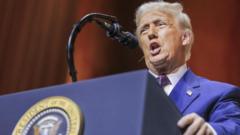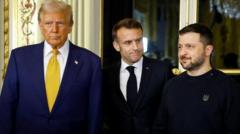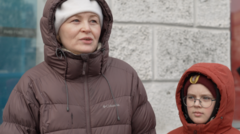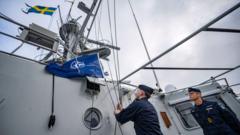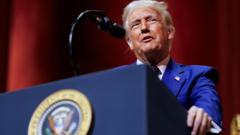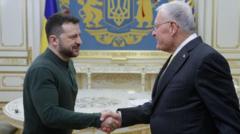In a recent address, Ukrainian President Volodymyr Zelensky detailed the strategic implications of military operations in Russia's Kursk region, asserting that they have effectively immobilized a significant portion of Russian forces, estimated at 50,000 soldiers. This diversion, according to Zelensky, reduces the offensive capabilities of Russia and prevents the deployment of troops to other critical combat areas within Ukraine.
Zelensky Claims Russian Troops in Kursk Detracted from Attacks on Ukraine
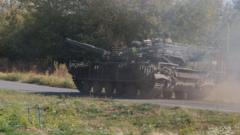
Zelensky Claims Russian Troops in Kursk Detracted from Attacks on Ukraine
Ukrainian President Volodymyr Zelensky asserts that his military presence in the Kursk region is keeping 50,000 Russian troops occupied, thereby diminishing their capability to launch further offensive actions within Ukraine.
While U.S. think tank Institute for the Study of War notes that Russia had initially deployed around 11,000 troops in Kursk during Ukraine's incursion beginning in early August, reports from the New York Times allege that Moscow has reinforced this number without reassigning troops from other regions. Instead, these reports indicate that up to 10,000 North Korean soldiers might be joining Russian forces in Kursk for a planned counter-offensive.
Zelensky's Commander-in-Chief, Gen Oleksandr Syrskyy, affirmed continued inspections and operations in Kursk, reiterating the importance of this military engagement in preventing Russian units from advancing in the vital Donetsk region. Ongoing combat persists in Donetsk, with both sides blaming each other for recent damage to vital infrastructure.
Additionally, amidst the backdrop of North Korea's strengthening ties with Russia, a new mutual defense treaty endorsed by Kim Jong-un may further complicate the dynamic of the conflict. Meanwhile, reports of former President Donald Trump’s interactions with Russian President Vladimir Putin have sparked discussions about potential changes in U.S. foreign policy regarding Ukraine as Trump's political future remains uncertain.
War in Ukraine continues to evolve, drawing in international actors and complicating the conflict with additional military alliances, as both Ukrainian and U.S. assessments highlight the increasing complexity of Russia's military strategies.
Zelensky's Commander-in-Chief, Gen Oleksandr Syrskyy, affirmed continued inspections and operations in Kursk, reiterating the importance of this military engagement in preventing Russian units from advancing in the vital Donetsk region. Ongoing combat persists in Donetsk, with both sides blaming each other for recent damage to vital infrastructure.
Additionally, amidst the backdrop of North Korea's strengthening ties with Russia, a new mutual defense treaty endorsed by Kim Jong-un may further complicate the dynamic of the conflict. Meanwhile, reports of former President Donald Trump’s interactions with Russian President Vladimir Putin have sparked discussions about potential changes in U.S. foreign policy regarding Ukraine as Trump's political future remains uncertain.
War in Ukraine continues to evolve, drawing in international actors and complicating the conflict with additional military alliances, as both Ukrainian and U.S. assessments highlight the increasing complexity of Russia's military strategies.




